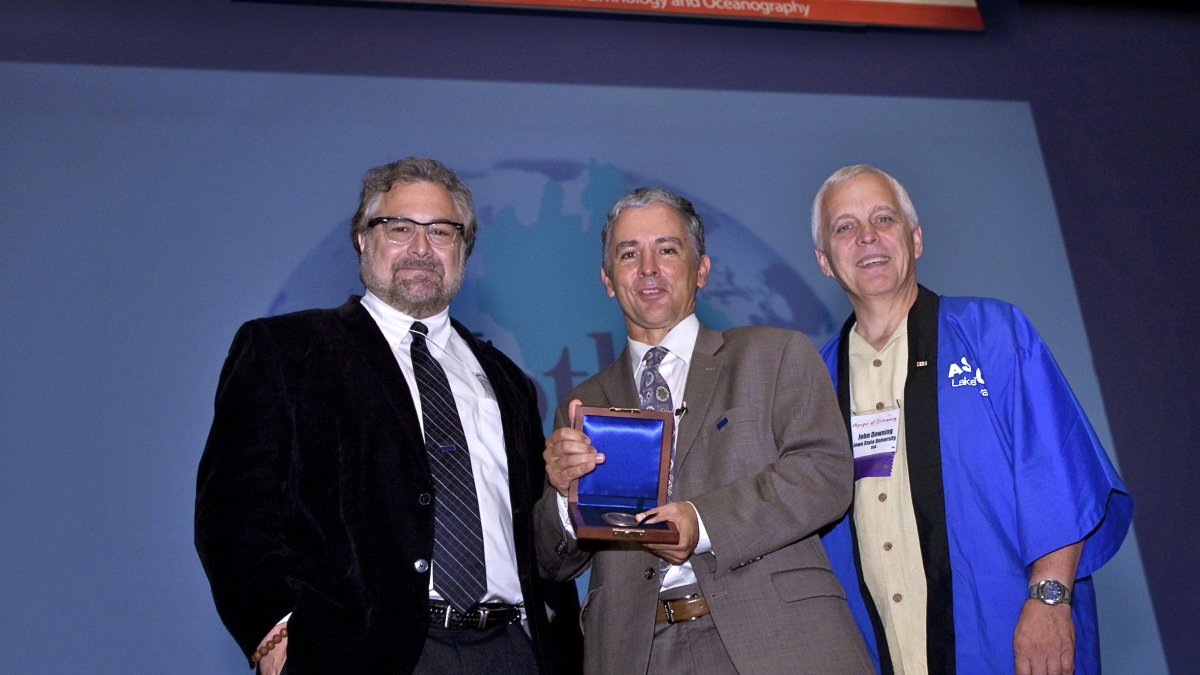ASU ecologist receives prestigious international award for water research

Elser elected president of global aquatic sciences organization
Arizona State University professor James Elser has received the G. Evelyn Hutchinson Award, the most prestigious global award in the aquatic sciences, at the July 2012 Association for the Sciences of Limnology and Oceanography (ASLO) meeting on the shores of ancient Lake Biwa, Otsu, Shiga, Japan. The Hutchinson Award is presented annually to recognize a scientist’s previous five to 10 years of excellence in limnology (the study of inland waters) or oceanography.
In addition, the organization has elected Elser as its next president. The largest international freshwater and ocean science professional society in the world, ASLO serves more than 4,000 members, including practicing scientists, engineers and educators. Elser will serve a six-year term, beginning with two years as president-elect. He will spend the following two years as president, and two more years as past-president.
“I was astounded to receive the Hutchinson award, as the list of previous recipients contains many of my scientific heroes,” said Elser, a Regents’ Professor and Parents Association Professor in ASU’s School of Life Sciences, in the College of Liberal Arts and Sciences. “It’s very hard to believe that my name will be added to this list. I am deeply honored not only to receive the award, but also to serve as president for an organization that has nurtured my career since graduate school. It’s the scientific society to which I feel most closely connected.”
“Jim has this ‘rock star’ personality,” said Deborah Bronk, ASLO’s outgoing president and professor at Virginia Institute of Marine Science, College of William & Mary. “He’s really gone out and promoted his ideas to a lot of different groups. He’s engaging people on a global level and is a skilled ambassador for limnology.”
Elser is particularly recognized for his outstanding work in pioneering a cutting-edge sub-discipline of ecology – ecological stoichiometry – which is the study of the balance of energy and multiple chemical elements in ecosystems. According to Elser, stoichiometric theory is increasingly important due to the fact that humans are altering most of Earth’s critical biogeochemical cycles, especially those for carbon, nitrogen and phosphorus. In addition, this theory is synthesizing our understanding of diverse ecological areas and evolutionary approaches.
In 2002, Elser teamed up with colleague Robert W. Sterner to publish “Ecological Stoichiometry: The Biology of Elements from Molecules to the Biosphere” – a book that analyzes new questions in ecology and evolution within a stoichiometric framework. This book is used in seminars and courses throughout the world. Elser’s research extends well beyond traditional borders – impacting not only the aquatic sciences but also terrestrial ecology and even into topics such as tumor biology and agricultural sustainability.
Bronk believes Elser has the experience and leadership skills necessary to deal with the tough issues, and, as ASLO’s president, nurture a new generation of scientists.
“There are really some awful global problems,” said Bronk. “The more we know about them, the more depressing it becomes as scientists. Jim is looking for fundamental similarities in how all systems behave around the world – the kind of work he does is applicable to all of them,” she added. “He also has the ability to capture the imagination of students and get them excited about figuring things out.”
Elser hopes to help address some of these pressing issues pertaining to the world’s lakes and other freshwater bodies as ASLO’s new leader.
“The most important problems facing our freshwaters stem from activities designed to increase agricultural production,” said Elser. “By increasing food production, more water will have to be withdrawn for irrigation. More fertilizer will be used on those crops, which then runs off and pollutes streams, rivers, lakes and coastal waters. To sustain safe drinking water, productive fisheries, and recreational benefits of lakes and rivers and oceans, we must develop much more sustainable agricultural practices.”
Elser is also a Distinguished Sustainability Scientist in ASU’s Global Institute of Sustainability, and a Fulbright awardee.